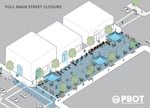UPDATE (1:35 p.m. PT) — Some Portland streets will be converted into outdoor plazas this summer, allowing residents to dine and shop while staying appropriately spaced from one another.
The city’s transportation bureau announced Thursday it will begin offering permits for businesses hoping to expand onto the sidewalks or streets outside their storefronts.
The bureau offered sketches of the plan, which show dining tables and merchandise displays occupying sections of side streets, curb zones and parking spaces. In the most expansive example, an entire main street would be closed off, allowing businesses to spill out onto the whole street. The bureau notes these full street closures won’t be allowed on streets that act as emergency or transit routes.
The applications and permits will be free and evaluated on a "case-by-case basis," according to the bureau. They're available immediately and will last until Oct. 1.
The program is part of the bureau’s Safe Streets initiative, an effort to close and modify streets to help Portlanders maintain social distancing protocols once the city reopens. The city has already closed many residential streets to through traffic as part of the program.
“Cities around the world are reallocating streets for people to support safe physical distancing,” said Commissioner Chloe Eudaly, who oversees the transportation bureau, in a statement. “Portland started with 100 miles of slow streets on our Neighborhood Greenways, closing them to through traffic to create more space for pedestrians and cyclists. Our next phase is working with our local business community to support their reopening and reimagine public space.”

A sketch provides an example of one of the ways the Portland Bureau of Transportation envisions closing off streets to allow businesses to utilize the space for customers and pedestrians during the coronavirus pandemic. PBOT has said this option, its most extensive version, would not be allowed on emergency or transit routes.
Courtesy of the Portland Bureau of Transportation
John Brady, a spokesperson for the transportation bureau, said the permits for retail businesses will start being processed immediately, but the county won’t be able to grant permits for dining until the current restrictions are lifted. Multnomah County Chair Deborah Kafoury said Wednesday the county is planning to apply on June 5 for the first phase of Gov. Kate Brown’s reopening plan.
Related: Multnomah County Planning To Apply For Reopening June 5
What form these plazas take will be, to a certain extent, up to the neighborhoods. The transportation bureau’s asking businesses to band together and coordinate their requests, so a chunk of the street can be in agreement about whether they want their street turned into a temporary plaza.
Keith Jones, the director of Friends of the Green Loop, said he got involved with the early stages of the proposal due to his work planning a “culinary corridor" for Portland, a long-simmering plan to allow businesses to operate in the right of way. That year-and-a-half long push had immersed him in some of the nitty gritty details that would be involved in operating businesses in the streets — for example, what kind of insurance you need, where the trash goes, and how security is handled.
He sees the transportation bureau as creating the needed mechanism for these outdoor businesses to operate during the summer. But for the plazas to come to fruition, he believes local associations will need to step in and guide the process.
“Neighborhood Associations have a role to play in clustering people together, so we can have a planned experience,” he said.
But, he emphasized, the experience should not feel like that of a street fair, and businesses will need to take precautions to make sure the streets are safe. He suggests businesses think about ways to manage occupancy, enforce lines, sanitize tables, and collect information for contact tracers.
Businesses appear eager to get the permitting process started. Zach Katz, a 26-year-old resident of Sunnyside, started a Facebook group called the "Portland Promenade Project," rallying support behind the idea of turning main streets in the Kerns and Sunnyside neighborhoods into promenades with outdoor cafés and open-air retail. After emailing local businesses in the area, he got a handful of businesses in each neighborhood to sign onto the plan.
Katz said he was inspired by the car-free streets of many European cities — and by the other cities like Tampa, Denver, Indianapolis, Vancouver, B.C., to name a few — that have mimicked the layout as they try to reopen.
Now, he’s ready for Portland to join the fray.
“Millions of people visit Europe because it’s so nice to walk down the-car free streets, and so we’re missing out big time by not having that here,” he said. “And we can. It’s finally possible.”
